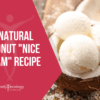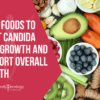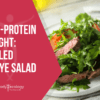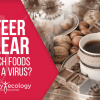Why Prebiotics are Essential to Your Heart Health & Immune System
The current statistics surrounding cardiovascular disease are truly astounding. According to the World Health Organization (WHO), cardiovascular diseases are the number 1 cause of deaths globally, claiming more lives each year than all forms of cancer. There are 92.1 million American adults living with some form of cardiovascular disease (or after effects of stroke), and 2,300 die each day from it.
The WHO also states that most cardiovascular diseases can be prevented by addressing risk factors like alcohol and tobacco use, unhealthy diet, lack of exercise and obesity. Notice that? PREVENTED. The medical community now knows that the health of gut microbiota can help reduce risk for cardiovascular diseases and boost immunity at the same time, so let’s dive in to see how to do just that.
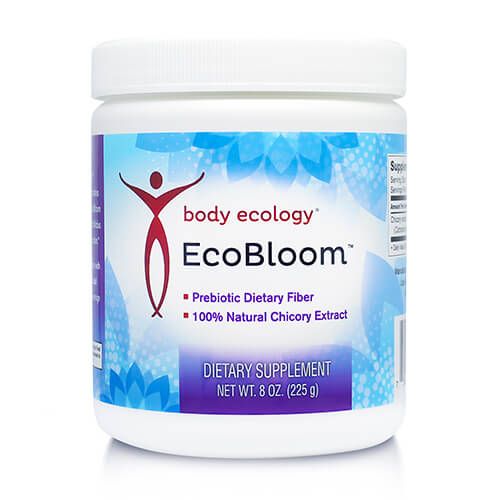
EcoBloom is 100% inulin, a prebiotic that not only boosts your immune system, but can help create a healthy gut microbiota which studies show can absolutely help prevent cardiovascular disease. It even makes your food taste better!
Prebiotics are not only an important part of creating a healthy inner ecosystem but studies show they offer promising benefits for your cardiovascular health, immunity and more. Prebiotics stimulate the growth of healthy microflora that populate your large intestine. When these healthy microflora (beneficial bacteria) are allowed to flourish, they help keep you healthy and strong.
Due to stress, the Standard American Diet (full of processed foods and sugar), lifestyle choices and regular use of antibiotics and other drugs, you may be lacking the microflora your body needs to maintain healthy digestion and to fight illness and disease.
And just as important, if parents lack a healthy inner ecosystem, they may pass this on to their children, setting the stage for a whole generation with lowered immunity. Read more in: What Every Woman Needs to Know NOW if They Every Want to Have a Baby.
Prebiotics and Probiotics
In a healthy body, your inner ecosystem contains enough good bacteria (microflora or probiotics) to outnumber the bad and help maintain control over them. Probiotics may be a buzzword in the health and wellness industry, but you need to consume plenty of prebiotics, to ensure you have enough probiotics populating your gut.
Prebiotics are derived from insoluble fiber and fructooligosaccharides or FOS (carbohydrate molecules made up of a relatively small number of simple sugars).
If you make fermented foods and drinks at home, you know that you have to add a prebiotic, like honey or EcoBloom, as food for the microflora.
While sweets like honey feed yeast and are not recommended on the Body Ecology program, the microflora in our Body Ecology fermented food and drink starters “eat” the sugar up in the fermentation process, leaving us with all the healthy benefits of fermented foods.
In fact, the combination of prebiotics and probiotics, as in fermented foods and drinks, have a combined beneficial or synbiotic effect for your health, which is why these foods and drinks are emphasized on the Body Ecology program.
In your body, prebiotics nourish the microflora (probiotics) and encourage them to work more efficiently, keeping you healthy and strong. The synbiotic effect from fermented foods and drinks means that not only do they help populate your intestines with beneficial bacteria, they also help improve the survival, implantation and growth of newly added microflora strains.
Once you’ve re-established your healthy inner ecosystem and have conquered viral, bacterial and fungal infections, you can add naturally sweet foods, like fruit, to your diet, which will also feed the microflora in your gut.
Until then, you have better choices for prebiotics, which we’ll outline below.
Types of Prebiotics
Anything with sugar in it can be a prebiotic, since microflora love to consume sugars.
Inulin – Inulin is found in 36,000 plants such as:
- Herbs – chicory root, burdock root and dandelion root
- Fruits – such as apples, bananas
- Sweet vegetables – such as onions, garlic, asparagus, leeks and Jerusalem artichokes
- Raw apple cider vinegar
- EcoBloom – Body Ecology’s prebiotic dietary fiber supplement
- Fructooligosaccharides (FOS), a subgroup of inulin, is also a prebiotic and is in, or added to, dairy foods and baked goods. It improves the taste and stimulates the growth of the beneficial bacteria, bifidobacteria.
- Human milk oligosaccharides are shown to also promote the important bifidobacteria.
What Can Prebiotics Do For You?
- Heart Health: Prebiotics have been shown to moderate cholesterol and triglyceride levels – both indicators of heart disease. Specifically, one study shows that inulin can reduce artherosclerosis, or hardening of the arteries, by 30%. As heart disease becomes more widespread among men and women, new approaches to treatment and prevention that do not involve medications are proving to be effective and have the added benefit of being side effect free (unless you count improved health as a side effect!).
- Immunity: From an immunity standpoint, who doesn’t want to feel better and get sick less often? In preliminary research, prebiotics boost white blood cells and killer T cells, and may even improve your body’s response to vaccinations. Children in one test group who ate yogurt containing inulin had fewer daycare absences, fewer doctor visits and took fewer antibiotics.
- Chronic Illness and Digestion: Because prebiotics act in your intestines, they have a profound effect on the pathogens and bad bacteria in your body that can cause disease. Prebiotics are being used to treat Irritable Bowel Syndrome and Crohn’s Disease, and may also prove useful for treating cancer, osteoporosis and diabetes.
Which Prebiotics are Best
Think of a fish tank: to keep your fish healthy, you need to keep their environment clean and give them food. Microflora are very similar: they need water and prebiotics (food), and since they are anaerobic, they do not like oxygen.
Pathogenic yeast (like the fungal infection, candidiasis) also feast on sugars and starches that easily break down into simple sugars. So the key is to focus on prebiotics that don’t feed these pathogens so you can encourage the growth of friendly microflora.
Donna Gates (founder of Body Ecology) created the gluten-free, casein-free, sugar-free Body Ecology system to starve pathogenic and infection-causing organisms while simultaneously feeding immune-enhancing good bacteria. So how do you feed the microflora but starve the pathogens (like candida)?
- Fermented Foods & Drinks – The Body Ecology program has a large array of fermented foods and drinks that you can choose from to get the symbiotic effect of prebiotics and probiotics. In the initial stage of the Body Ecology program, here are some options: cultured vegetables, CocoBiotic and Young Coconut Kefir.In the later stages (after about 3 months or when you conquer candida and your inner ecosystem is re-established), add milk kefir and fermented soy foods (like natto, miso and wheat-free tamari).
- Sour Fruit – In early stages of the Body Ecology program when your inner ecosystem is still being recolonized by good bacteria, take special care to avoid all sugars, even natural ones found in fruits. Initially, we recommend only these sour fruits: lemons, limes, unsweetened black currants and unsweetened cranberries.
- Gluten-Free Grains – While grains like wheat act as prebiotics, they also feed yeast. Body Ecology grain-like seeds (amaranth, quinoa, millet and buckwheat) are gluten-free alternatives that act as prebiotics AND don’t feed pathogenic yeast. For more information on our recommended grains, read: The Risks of Choosing Typical Grains and the Healthy Grains to Choose Instead.
- Sweet Vegetables – Vegetables are 80% of the Body Ecology Diet, so you can eat plenty of asparagus, leeks, onions, garlic, Jerusalem artichokes and other sweet vegetables to feed healthy microflora without feeding pathogenic yeast.
In order to stimulate more good bacteria in the gut, it’s important to add prebiotics (the food for good bacteria) so that the good bacteria can multiply more rapidly and flourish in your system to fight disease. EcoBloom Prebiotic, Body Ecology’s 100% powdered chicory inulin, can be used as your fermented food and drink prebiotic, giving any good bacteria in your gut a chance to boost your immunity and cardiovascular health. You can even add it to soups, salad dressings, sauces and beverages.
We are still discovering all the amazing intricacies of the human body and digestive system, and it’s great that research supports what Body Ecology has long taught about health and healing: whole foods that feed your inner ecosystem are the way to maintain health and wellbeing.
At Body Ecology, we have always recommended the principle of balance and the principle of uniqueness in all the guidelines we suggest, but one thing seems to remain constant among the thousands who’ve found health with our system: a return to the way of eating that heals your inner ecosystem results in improved health, energy and immunity. That is our, and Donna’s, wish for this and future generations.
Sources:
- Daniells, Stephen, Prebiotics Could Reduce Artery Hardening, Boost Heart Health, NutraIngredients.com, July 2008.
- Coppa, GV, et al., Prebiotics in Human Milk: a Review, Dig Liver Dis. 2006 Dec;38 Suppl 2:S291-4.
- Hamilton-Miller, JMT, Probiotics and Prebiotics in the Elderly,
- New Research Shows Beneo Prebiotics Could Improve Heart Health, NewHope.com, December 2006.
- Saavedra, J.M. and Tschernia, A., Human Studies With Probiotics and Prebiotics: Clinical Implications, British Journal of Nutrition, Volume 87, Supplement s2, 1 May 2002, pp. 241-246(6).
- Min-Tze Liong, et al., Cholesterol-lowering effects of Probiotics and Prebiotics.
- Ryan, Paul. M., et al., Functional food addressing heart health: do we have to target gut microbiota? Current Opinion in Clinical Nutrition and Metabolic Care. November 2015 – Volume 18 – Issue 6 – p 566–571


